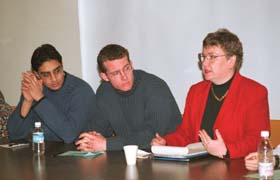
| ||
 | ||
 Students Satyam Malhotra and Andrew Kovacs and first-year coordinator Leslie Copeland PHOTO: OWEN EGAN |
Stressed and perplexed: First-year students have their say
|
SYLVAIN COMEAU | Out-of-town McGill students gave mixed grades to their first-year university experience at a recent symposium.
In interviews following the event, many students said that universities could do more to ease the transition from high school to the independence of university life. "In my experience, the individual is left mostly to sink or swim on their own," Tracy Tang, a fourth-year visiting student from the University of British Columbia, recalls. "New students have to find out a lot by themselves." Several students, particularly those in science, remember the struggle of trying to make it to their second year in programs which appear to be designed to "weed out" many of the students in their programs. "The perception among science students is that the first year is intended as a weeder year," says Andrew Kovacs, a third-year biology student from Hamilton, Ontario. "There is a 'cut-off' in a lot of programs, which means that only a certain number of students will be able to get in. "There is a feeling among the students that the professors are out to get you. That comes through in the way we are evaluated; we get multiple choice exams which are very hard and full of irrelevant questions. It's a matter of surviving, not about how much or how well you learn." Kovacs believes that the sheer amount of information students need to know in their first year of university forces them to memorize rather than learn. "I can't remember anything that I learned in first year because we would just memorize a bunch of life cycles and formulae, then forget it all after the exam. The students can't see the value of that kind of education, unless it is just to separate the students who are willing to work that hard from those who aren't. It's a Darwinian process." Tang concurs with Kovacs. "First year seems to be designed to choose the students who will go on to a major and the ones who won't make it. It makes sense because the University has to limit the number of people entering a major. "I think [professors] want to cultivate knowledge and share and communicate. But at the same time, there's this machine called the University and they have to abide by the system in place." Tang, who did her first year at UBC, says that she and the other panelists were leveling criticism not at McGill but at universities in general. "If a professor is told that only 75 per cent can advance to a major, they will grade on a curve, to arbitrarily eliminate 25 per cent of the students trying to get in. It's a numbers game and this kind of thing happens across the board... It's typical of most universities, not just McGill." Large class sizes are a common complaint for university newcomers -- they became accustomed to the more personal attention they received in smaller high school classes. First-year student Ariella Bock, who hails from Boston, says that her typical class size is 300. "In that class size, the teacher wouldn't recognize you if he passed you on the street; you're lucky if you get to know a [teaching assistant]. You have a much better chance of getting a good grade in a small class." Tang says that, because of their size, universities cannot completely alleviate some feelings of alienation. "Even if you are not coming in from out of town, a feeling of foreignness is common. Even the biggest high school is nothing compared to university, and students feel like they are just a face in the crowd. Universities can't do anything about their sheer size, but they do offer resources like the first-year coordinator, the orientation office and the Welcome Centre." First year science student Rylee Kurran feels that students have to make the first step and be willing to ask for help. "First-year is all about adjusting. I can see how people feel that they're getting lost in the system; there's a lot of red tape, because it's a big institution. But I know that if you stick to it, you can get the help you need." "In a class of 500 students, the onus is on me to go see the professor if I'm not doing well," says Kovacs. "A lot of students value that kind of independence." The symposium was organized by Associate Dean of Students Rhonda Amsel and the Centre for University Teaching and Learning.
|
|
| |||||